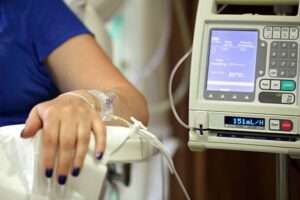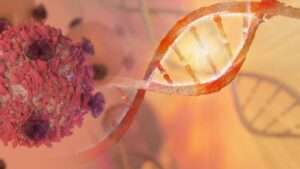Bladder Cancer Treatment Cost in India: A Detailed Guide
Did you know India is an attractive destination for top-notch care at a fraction of the price elsewhere? That’s true! The bladder cancer treatment cost in India ranges from 5,000 to 11,000 USD.
 Bladder cancer is a severe medical condition that develops in the bladder’s tissues. Bladder cancer ranks as the sixth most common cancer worldwide, making up 3.7% of all new cancer cases.
Bladder cancer is a severe medical condition that develops in the bladder’s tissues. Bladder cancer ranks as the sixth most common cancer worldwide, making up 3.7% of all new cancer cases.
- In 2018, Canada reported 30,700 individuals living with bladder cancer, with 9,160 new cases diagnosed during that year.
- In 2020, the global mortality from bladder cancer was 212,536, with the mortality rate higher in men (158,785) as compared to women (53,751).
- The ACS (American Cancer Society) estimates that in 2023, there will be around 82,290 new incidences of bladder cancer in the United States alone. From these, about 16,710 cases will result in deaths.
India has made significant advancements in the medical field, and bladder cancer treatment is no exception. Statistics show that an increasing number of international patients are selecting India for their medical treatments. This is due to the skilled professionals and the cost-effectiveness of treatments offered.
Speaking of experts in the field, we introduce you to Dr. Sridhar PS, a renowned radiation oncologist in India. His expertise and the use of advanced technologies represent the pinnacle of medical care in this field.
Are you exploring cutting-edge treatment options at affordable prices? Please consult CyberKnife specialist Dr. Sridhar PS, a dedicated expert for non-invasive bladder cancer treatment in Mumbai.
Let’s look at the financial considerations of bladder cancer treatment in India.
Bladder Cancer Treatment Cost In India
| Treatment Option | Description | Cost (in USD) | Recovery Time |
|
|
A technique where high-energy rays or particles kill or shrink cancer cells in the bladder. Often used to treat early-stage bladder cancers or as supportive therapy post-surgery. | 4,500 – 6,500 | 2 – 4 weeks |
|
|
Involves the use of powerful drugs, either orally or intravenously. The drugs target and kill the rapidly dividing cancer cells. It can be systemic (affecting the whole body) or localized (directed at the bladder area). | 5,000 – 7,500 | 3 – 6 weeks |
|
|
Immunotherapy uses medicines to stimulate the body’s immune system to recognize and combat bladder cancer cells. It’s often reserved for cases where the cancer doesn’t respond to other treatments. | 6,500 – 8,500 | 2 – 4 weeks |
|
|
Unlike traditional chemotherapy, targeted therapy aims at specific genes or proteins in cancer cells or cells related to cancer growth. This allows for more precision in treating the disease. | 6,000 – 8,000 | 2 – 4 weeks |
|
|
A surgical procedure to remove cancerous tissues. Depending on the stage and type of bladder cancer, this could range from removing tumors from the bladder’s lining to a complete bladder removal (cystectomy). | 8,000 – 11,000 | 4 – 8 weeks |
Now, let’s shift gears and look at an alternative approach. Have you heard about the Bladder Preservation Protocol? Let’s explore this groundbreaking approach.
Bladder Preservation Protocol (BPP)

These plans often include a combination of therapies, such as:
- intravesical installations (directly infusing medication into the bladder)
- targeted drug therapies
- lifestyle modifications
The cost of the procedure is ₹50,000 to ₹2,00,000. The recovery time can take a few weeks to months.
BPP focuses on maintaining bladder function and integrity while minimizing invasive procedures. This approach primarily benefits patients who may not want surgery or prefer less invasive treatment options. BPP is a testament to advancing medical practices prioritizing patient comfort and individualized care.
Are you wondering how the cost of treating bladder cancer in India compares to other countries? Let’s take a look.
How much does TomoTherapy Cost in India?
On average, the TomoTherapy treatment cost in India starts from 4,13,952 INR (approx. $5000). This may include consultation charges, basic examinations and tests, treatment costs, and doctor’s fees.
Some tomotherapy centers in India charge separately for routine pharmacy, specialty consultations, accommodation, and patient food.
What are the Benefits of TomoTherapy?
With TomoTherapy, radiation oncologists can precisely target the tumor’s size, shape, and location by adjusting the radiation beam’s size, shape, and intensity.
Some of the additional advantages that TomoTherapy offers include the following:
- It directs more radiation at the tumor and minimal on the surrounding healthy tissues.
- It focuses higher doses of radiation on the tumor.
- Moreover, it targets tumors with optimal radiation doses.
- It lowers the side effects of radiation therapy.
TomoTherapy radiation may be an option for some cancer patients who have received the maximum dosage of conventional radiation they can tolerate
Risks and Side effects of TomoTherapy
The short-term side effects of TomoTherapy may be similar to those of other radiation therapy techniques.
For instance, adverse effects from radiation therapy on the head could include:
- dry eyes
- mouth sores
- headaches
- eating difficulties
Typical side effects of TomoTherapy include:
- Skin inflammation, peeling, or redness
- Fatigue
- Nausea
- Hair loss in the treated area.
Most TomoTherapy side effects go away quickly once the treatment is stopped. Some may still be around following treatment, but they usually go away over several months.
TomoTherapy may have specific long-term side effects, like skin changes or a minuscule risk of acquiring second cancer, similar to many cancer treatments.
What to Expect During TomoTherapy?
TomoTherapy is a form of outpatient treatment. It is as painless and non-invasive as a CT scan or X-ray. Usually, the treatment lasts for over one to eight weeks. About 15 to 20 minutes are spent on each TomoTherapy session.
Pre- and Post-Treatment
- When you arrive for treatment, a radiation therapist will assist you in positioning yourself in the TomoTherapy treatment room.
- The therapist may fit you with a gadget to help you stay still throughout therapy while you are most likely lying on your back. Your skin may be lightly marked to align the treatment area’s equipment.
- For pre-treatment imaging, you will go through the TomoTherapy machine once. Your radiation treatment plan or posture might be altered considering these images.
- You will gently move through the machine while the customized treatment is administered.
Are you wondering how the cost of treating bladder cancer in India compares to other countries? Let’s take a look.
| Country | Cost Range (USD) |
| India | $4,500 – $11,000 |
| Thailand | $5,000 – $12,000 |
| Brazil | $6,000 – $15,000 |
| South Korea | $10,000 – $30,000 |
| Singapore | $15,000 – $40,000 |
| Germany | $18,000 – $48,000 |
| UK | $20,000 – $50,000 |
| Australia | $22,000 – $55,000 |
| Canada | $24,000 – $57,000 |
| USA | $25,000 – $60,000 |
Please visit radiation oncologist Dr. Sridhar PS to get an estimate of bladder cancer treatment based on the treatment type and stage of cancer.
Urine bladder cancer treatment cost in India can vary based on various factors. Read on to understand the treatment-based and stage-based factors.
Treatment-based Factors Affecting Cost:
Urine bladder cancer treatment cost in India can vary based on various factors. Read on to understand the treatment-based and stage-based factors.
Type of Treatment: The treatment type (surgery, radiation therapy, etc.) significantly impacts the cost. Each treatment has its own set of procedures, equipment, and drugs, affecting the overall pricing.

Technology Used: Advanced, non-invasive, and precision-based technologies, like robotic-assisted surgery or CyberKnife, can be more expensive.
Hospital Facility: The choice of hospital, whether a government hospital, a private hospital, or a luxury hospital, plays a significant role in determining the cost.
Doctor’s Experience: Treatment from renowned specialists can be costlier due to their expertise and demand.
Stage-based Factors Affecting Cost:

Localized (Invasive cancers): Treatment for cancers that have invaded the muscle layer but not spread to other body parts is more complex. It might involve a combination of therapies like radical cystectomy, chemotherapy, and radiation. This escalates the cost.
Advanced Stage: For cancers that have spread to distant parts of the body will require comprehensive treatment involving:
- surgery to remove the tumor
- chemotherapy to kill cancer cells
- radiation, and possibly targeted therapy or immunotherapy
Such multi-modal treatments significantly drive up the cost.
Recurrence: Additional treatments or procedures will be necessary if the cancer returns post-treatment. This can further increase the cost.
While these factors play a role in determining the cost, the primary aim should be effective treatment and the patient’s well-being.
Success Rate Of Bladder Cancer Treatment In India
India’s medical field has advanced swiftly, with top-notch specialists like Dr. Sridhar PS using cutting-edge technologies. This has led to higher survival rates, especially with early-stage bladder cancer treatments like BCG (Bacillus Calmette-Guerin).
BCG (Bacillus Calmette-Guerin) treatment can have a success rate of 100% if bladder cancer is detected in the early stages. The success rate can remain as high as 90% even in the later stages. Factors such as the patient’s age and the cancer stage can impact the success rate of urinary bladder cancer treatment in India.
The cost of BCG treatment for bladder cancer in India is much more affordable compared to many other nations. Treatment costs start at USD 4400, and the overall price depends on the therapy type and the results of medical examinations.
Why Choose India For Bladder Cancer Treatment?
Expert Doctors: India is home to some of the world’s best-trained cancer specialists, ensuring top-tier expertise in your care.
Advanced Technology: Leading hospitals in India are equipped with the latest medical technology, offering the most up-to-date treatment methods.
Affordable Costs: You’ll receive high-quality medical care at prices significantly lower than in many Western countries.
High Success Rates: With early detection and the proper treatment, the success rates for bladder cancer in India are commendable.
World-class Facilities: Indian hospitals prioritize patient comfort with clean, state-of-the-art infrastructure.
English-speaking Staff: For international patients, language won’t be a barrier. Many medical professionals and staff speak fluent English, ensuring clear communication.
Personalized Care: Indian doctors and hospitals are known for providing care tailored to individual patient needs, ensuring a holistic approach.
Easy Medical Visas: Recognizing the value of medical tourism, India has simplified the visa process for medical travelers, ensuring a hassle-free experience.
Your health and well-being are crucial. When considering where to seek treatment, India offers both quality and value.
Remember, your health is paramount. Choose wisely!
Do you want to dive into the future of medicine with Dr. Sridhar? Watch the eye-opening YouTube clip on the non-invasive CyberKnife Treatment:
Why choose Dr. Sridhar for bladder cancer treatment in India?
- Top Expertise: He’s among India’s top radiation oncologists.
- Versatile Specialist: Dr. Sridhar tackles both benign and malignant tumors.
- Vast Experience: With over two decades in the field, he’s administered various radiation treatments for numerous cancers.
- Innovative Approach: He’s well-versed in the latest, including functional radiosurgery, high-precision radiotherapy, genomics, and radiogenomics.
- Technique Master: Expertise in advanced radiation techniques such as IGRT, IMRT, SBRT, chemoradiotherapy, and tomotherapy.
- CyberKnife Pro: He’s a renowned CyberKnife specialist, completing over 2700 procedures. One of the best doctors in India with expertise in such advanced and non-invasive techniques!
- Reputable Affiliation: He practices at Apollo Hospitals in Bangalore and Mumbai, leaders in innovative cancer care.
- World-class Facilities: Apollo Hospitals provide top-notch equipment and breakthrough treatments.
Trusting your health with Dr. Sridhar PS means getting care from a seasoned and dedicated expert in the field. Choose the best for your well-being!
Case Study: Bladder Cancer Treatment in India by Dr. Sridhar PS
Patient Name: Rajan Sharma
Age: 52
Symptoms: Rajan began noticing frequent urination, occasional blood in urine, and persistent pain in his lower back.
Tests Performed:
Upon consulting with Dr. Sridhar PS, Rajan underwent a series of diagnostic tests, including:
- Urinalysis
- Cystoscopy
- Imaging tests: CT Scan and MRI
- Biopsy
Diagnosis: The tests confirmed that Rajan had stage II bladder cancer.
Treatment: Dr. Sridhar PS devised a comprehensive treatment plan:
- Transurethral resection of bladder tumor (TURBT) – to remove the cancerous tissue.
- Chemoradiotherapy – combining chemotherapy with radiation for better results.
- They were followed by sessions of CyberKnife treatment, given Dr. Sridhar’s expertise in this area.
Post-treatment, Rajan was closely monitored with regular check-ups to ensure there was no recurrence of cancer.
Testimonial by Rajan Sharma:
“Getting diagnosed with bladder cancer was one of the most challenging moments of my life. However, with Dr. Sridhar PS by my side, I felt confident and cared for. His expertise made a significant difference, especially with the non-invasive CyberKnife treatment. Today, I’m cancer-free and owe much of this journey’s success to Dr. Sridhar and his dedicated team at HCG Hospital.”
Frequently Asked Questions
Bladder cancer is a disease where cells in the bladder grow uncontrollably, forming tumors. It starts in the inner lining and can spread to other parts.
Bladder cancer ranks among the top ten most diagnosed cancers. Regular screenings can aid in early detection.
Coverage varies by policy. It’s essential to check with your insurance provider to understand the specifics of your plan.
Some patients experience urinary issues, fatigue, or changes in sexual health. Regular follow-ups with your doctor can help manage and monitor these effects.
Frequency depends on risk factors like age, smoking, and family history. Your doctor will recommend a suitable screening schedule.
Some studies suggest a high-fat diet might increase the risk. Consuming fruits, veggies, and whole grains is generally recommended.
Yes, smoking significantly raises the risk of bladder cancer. Quitting reduces this risk over time.
During treatment, you may need adjustments in daily activities. However, many patients lead a relatively normal life post-treatment.
Absolutely! Organizations such as the Indian Cancer Society and Cancer Patients Aid Association often facilitate such support groups or can guide patients to appropriate resources. Additionally, many hospitals and healthcare facilities in major cities may have in-house support systems.
It’s rare but can be a side effect of specific treatments or dyes used in medical tests. Always consult your doctor about unusual symptoms.
Yes, it can. Regular check-ups and screenings are crucial to catch any potential recurrences early.
Remember, your doctor is the best source for specific questions about your health and treatment. It’s always good to stay informed!


 Radiation Therapy
Radiation Therapy Chemotherapy
Chemotherapy Immunotherapy
Immunotherapy Targeted Therapy
Targeted Therapy Surgery
Surgery